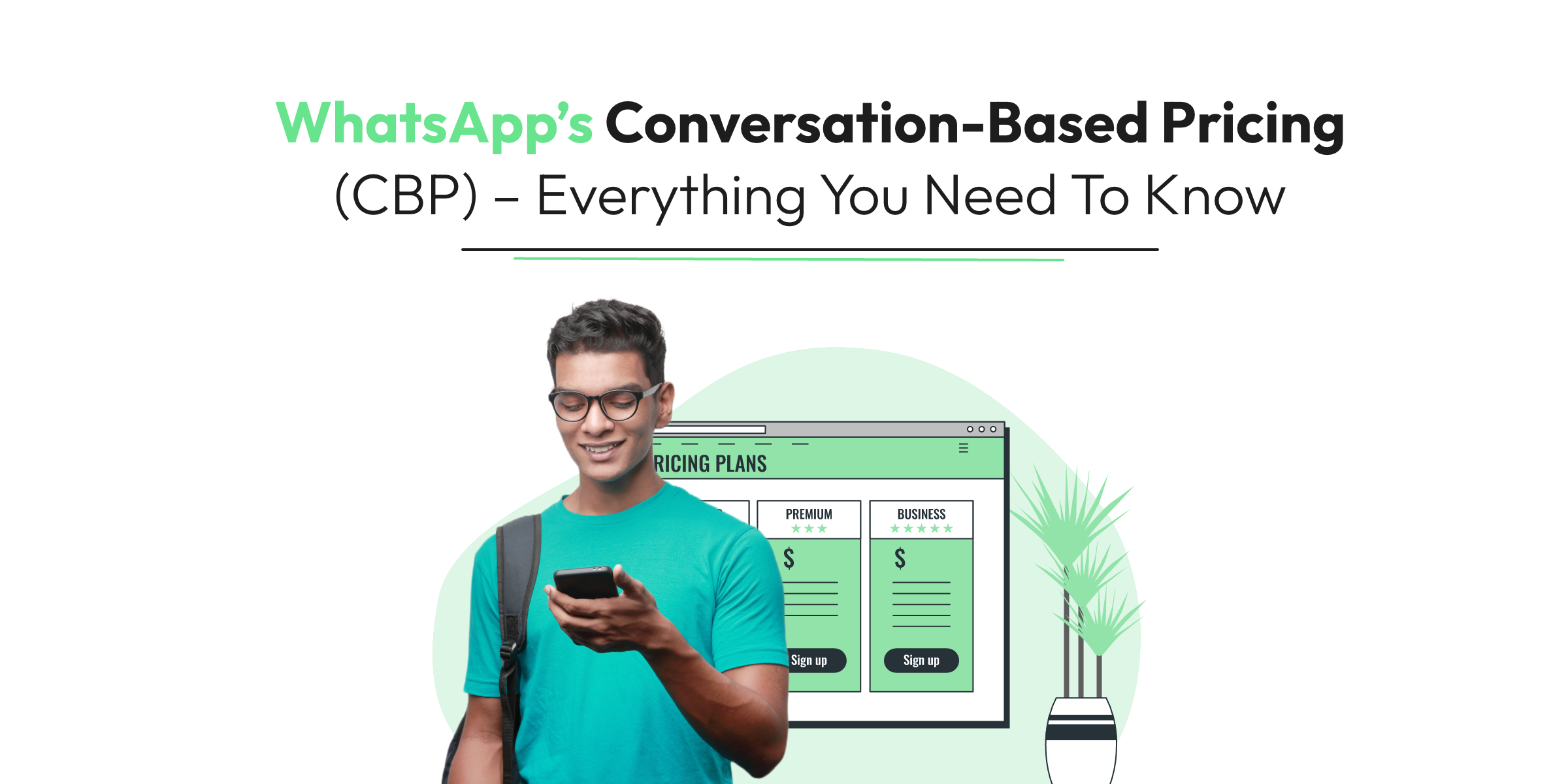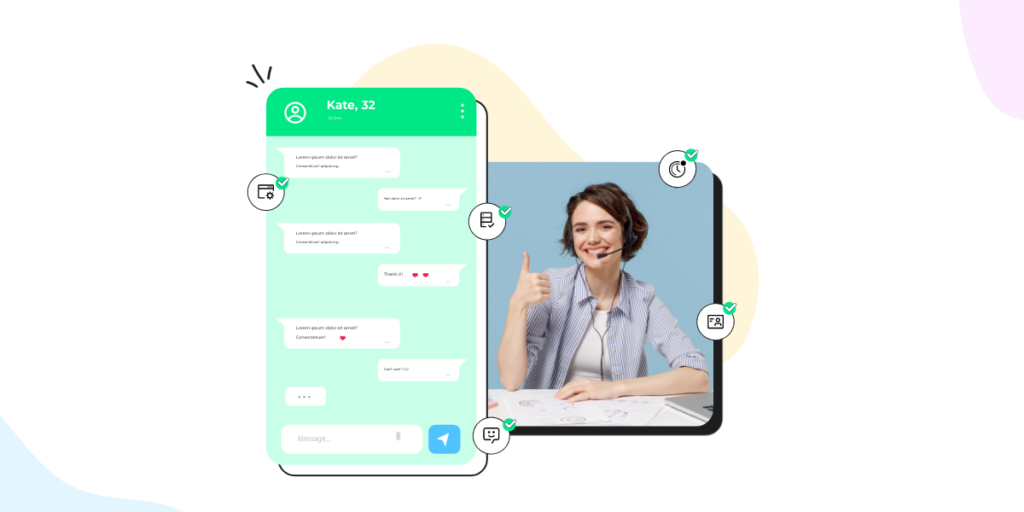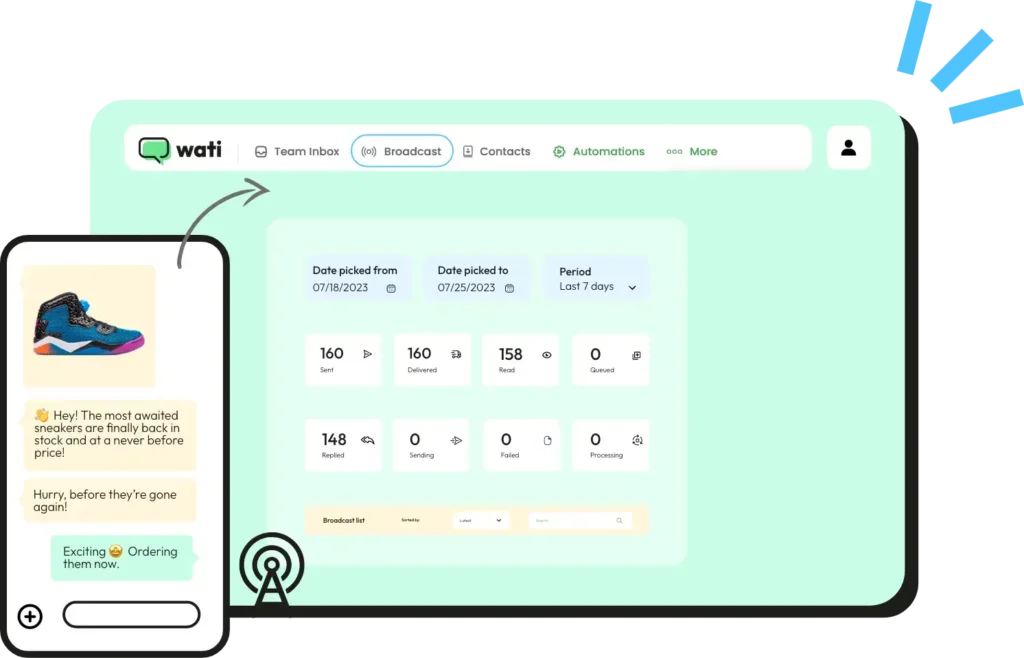
WhatsApp’s Conversation-Based Pricing (CBP) – Everything You Need To Know
Written by: Dheeraj Kumar Singh | on: January 24, 2022 | Last updated on: January 25, 2024 | According to: Editorial Policies
Have you ever wondered how WhatsApp’s Conversation-Based Pricing (CBP) is revolutionizing the way companies interact with their customers? If so, you’re about to embark on an enlightening journey through the ins and outs of this innovative pricing structure. You are in the perfect spot to learn about a pivotal shift in customer communication that is reshaping the landscape for businesses worldwide.
We will delve into how WhatsApp’s Conversation-Based Pricing (CBP) meticulously refines the user experience and nurtures sustainable interactions, establishing itself as a transformative force in digital communication. As we journey through this guide, you will not only become familiar with CBP but also master it, turning the potential of becoming a CBP expert into your new reality.
Prepare to have your perspective on business communication transformed. Let’s take the plunge into the world of WhatsApp’s Conversation-Based Pricing together. 🚀
What is WhatsApp’s Conversation-Based Pricing (CBP)? 🧐
To begin with, let’s clarify the concept of Conversation-Based Pricing. CBP serves as a billing system that WhatsApp employs for its Business API, charging businesses according to the conversations they hold with customers.
Put simply, you pay for the messages you share with your customers. This pricing model promotes purposeful communication and assists businesses in managing their messaging expenses effectively.
How WhatsApp’s Conversation-Based Pricing (CBP) Works – The Nitty-Gritty
Grasping the intricacies of WhatsApp’s Conversation-Based Pricing (CBP)can significantly benefit businesses using WhatsApp for customer interactions.

WhatsApp’s Conversation-Based Pricing (CBP) – Pricing Structure
| Pricing Element | Description | Cost Implication |
|---|---|---|
| Session Messages | Unlimited within 24-hour window | Fixed fee |
| Template Messages | Pre-approved for specific outreach | Additional charge |
| Verification | One-time number verification | Small fee |
CBP’s structure is thoughtfully designed to cater to various messaging needs. Here’s a detailed breakdown of its threefold approach:
1. Session Messages
These form the core of the WhatsApp’s Conversation-Based Pricing (CBP) model, where businesses are charged a fixed fee to send unlimited messages within a 24-hour window following a customer’s last message. This window promotes uninterrupted, fluid conversations without the worry of incremental costs.
2. Template Messages
For communication outside the 24-hour session, businesses use template messages. These messages, which are pre-approved by WhatsApp to maintain quality, come with an additional cost. They are essential for keeping in touch with customers, especially for sending notifications or updates after the session window has lapsed.
3. Phone Number Verification
WhatsApp enforces a nominal fee for the verification of business phone numbers. This process is critical for businesses to gain a verified status, represented by a green checkmark, enhancing the brand’s authenticity and trustworthiness in the eyes of the customers.
Through these defined categories, WhatsApp’s Conversation-Based Pricing (CBP) promotes a strategic approach to customer communication. It encourages businesses to engage meaningfully during active sessions and provides the tools to continue the dialogue, all while establishing a verified presence on the platform.
The Benefits of WhatsApp’s Conversation-Based Pricing (CBP) 🌟

The advent of WhatsApp’s Conversation-Based Pricing (CBP) has introduced a myriad of benefits that cater to businesses aiming for efficiency and deeper customer connections. 🌟 Here’s why CBP should be a cornerstone of your customer engagement strategy:
1. Precision in Cost Management
WhatsApp’s Conversation-Based Pricing (CBP) transforms the way businesses budget for customer interactions. By aligning costs directly with customer conversations, it eliminates the guesswork and wastage associated with traditional messaging expenses. This precision in cost management empowers businesses to allocate resources wisely, ensuring that every penny spent is an investment in building customer relationships.
2. Elevated Customer Conversations
WhatsApp’s Conversation-Based Pricing (CBP) model actively encourages businesses to prioritize the quality of each interaction. Consequently, businesses strive to create impactful messages that resonate with their audience, fostering an environment where customer engagement thrives. Subsequently, this focused effort leads to a positive feedback loop: satisfied customers often translate into repeat business, driving the company’s success forward.
3. Simplified Communication Flow
CBP demystifies the complexity of messaging systems. The delineation between session messages for ongoing dialogues and template messages for specific outreach purposes streamlines communication. This clear structure allows businesses to navigate customer conversations with ease, ensuring no customer query goes unanswered.
4. Adaptability and Growth Accommodation
WhatsApp’s Conversation-Based Pricing (CBP) is designed to scale. Whether you’re a fledgling startup or an expanding enterprise, the model adjusts to the volume and frequency of your customer interactions. This scalability is crucial for businesses as they evolve, providing a consistent and reliable framework for customer communication at every stage of growth.
5. Consistency in Customer Experience
Consistent customer experience is another understated benefit of WhatsApp’s Conversation-Based Pricing (CBP). By standardizing the way businesses approach messaging, CBP ensures that customers receive a uniform level of attention and service. This consistency is key to building trust and a strong, loyal customer base.
6. Regulatory Compliance
With pre-approved template messages, businesses can ensure compliance with regulatory standards, reducing the risk of non-compliance penalties. This is especially beneficial for industries with stringent communication guidelines.
The Advantages of WhatsApp’s Conversation-Based Pricing (CBP)
Economic Efficiency
- Budget Management: Precise cost allocation for customer conversations.
- Reduced Overhead: No extra costs for messages that don’t contribute to customer engagement.
Enhanced Customer Relations
- Quality Interactions: Focus on meaningful communication leads to higher customer satisfaction.
- Customer Retention: Satisfied customers are more likely to be loyal and offer repeat business.
Operational Simplicity
- Streamlined Processes: Clear distinction between session and template messages simplifies management.
- Compliance Assurance: Pre-approved templates ensure messages adhere to regulatory standards.
Scalability
- Flexible Growth: Adapts to the frequency of customer interactions as businesses grow.
- Volume Management: Can handle varying volumes of messages without compromising service quality.
In summary, WhatsApp’s Conversation-Based Pricing (CBP) isn’t just a billing methodology; it’s a strategic tool that aligns cost with communication efficacy. It encourages businesses to focus on what truly matters—building lasting customer relationships—while providing a flexible, scalable, and compliant platform for doing so.
The Anatomy of Business Conversations on WhatsApp

In the dynamic world of WhatsApp’s Conversation-Based Pricing (CBP), every message plays a pivotal role. Businesses must grasp the subtleties of each conversation category to fine-tune their communication strategies effectively.
Starting with Marketing, companies actively engage customers with promotions and product updates. Next, through Utility conversations, they provide transaction-related information. Then, Authentication messages ensure security during critical interactions. Finally, Service conversations allow businesses to directly resolve customer inquiries. Understanding and skillfully applying these categories empowers businesses to utilize WhatsApp’s CBP to its fullest potential.
Marketing Conversations
Marketing conversations are the spearhead of customer interaction. They’re designed to captivate interest and drive engagement by sharing targeted information about new offerings, promotions, or products. These conversations might include:
- Promotional Campaigns: Announcing sales or special deals to entice purchases.
- Product Recommendations: Suggesting products based on customer preferences or purchase history.
- Abandoned Cart Reminders: Encouraging customers to complete purchases they left behind.
Strategically, marketing conversations should be personalized and timed to align with customer behaviors and preferences, maximizing the likelihood of conversion.
Utility Conversations
Utility conversations serve as the backbone of customer transactions, facilitating seamless post-purchase interaction. These include:
- Order Confirmations: Reassuring customers with immediate transaction acknowledgment.
- Shipping Updates: Keeping customers informed about their order’s journey.
- Billing Statements: Providing clear and concise billing information on a recurring basis.
Efficiency and clarity are paramount in utility conversations to foster trust and transparency between the business and the customer.
Authentication Conversations
Authentication conversations are the gatekeepers of user security, offering a layer of protection for both the business and the customer. These conversations typically involve:
- One-Time Passcodes (OTPs): Enhancing security for account registrations or transactions.
- Account Recovery: Assisting users in regaining access to their accounts.
- Integrity Challenges: Confirming user actions to prevent fraudulent activities.
Promptness and reliability are critical in authentication conversations to ensure a secure and user-friendly experience.
Service Conversations
Service conversations are the responsive element of customer interaction, addressing inquiries and issues raised by users. These conversations might cover:
- Support Queries: Providing solutions to customer questions or problems.
- Feedback Collection: Gathering customer opinions to improve products or services.
- Issue Resolution: Assisting customers through challenges they’re facing with a service or product.
Each conversation category distinctly influences the customer’s journey on WhatsApp. Initially, businesses can captivate prospects by crafting engaging marketing dialogues. Then, as customers progress, the businesses actively adapt their communication, seamlessly transitioning from acquisition to nurturing. Ultimately, this strategic fine-tuning paves the way for a robust communication strategy that supports the entire customer lifecycle, ensuring a consistent path from acquisition to retention.
By dissecting and mastering these conversation categories, businesses can craft messages that not only comply with WhatsApp’s Conversation-Based Pricing (CBP) framework but also resonate with customers, driving engagement and fostering long-term loyalty.
Wati: Elevating Your WhatsApp’s Conversation-Based Pricing (CBP) Experience

As businesses transition to Conversation-Based Pricing (CBP) on WhatsApp, having a reliable platform to facilitate this change becomes paramount. Enter Wati. Tailored to enhance the WhatsApp Business experience, Wati is not just another tool, but a comprehensive suite designed to streamline and elevate CBP interactions.

Why Wati is the Ideal Choice:
Within the vast ecosystem of messaging tools, firstly, Wati distinguishes itself with its precise alignment to the needs of businesses using WhatsApp’s Conversation-Based Pricing (CBP). Moreover, beyond its feature-rich design, Wati is further backed by an intuitive interface and robust backend infrastructure. Consequently, this ensures that businesses can tap into the CBP’s full potential with ease and confidence.
Delving into Wati’s Core Features:
- Seamless Integration:
- Smooth Onboarding: With Wati, businesses can effortlessly integrate their existing systems with the WhatsApp Business API. This seamless transition ensures that there’s minimal downtime and businesses can hit the ground running.
- Impact: Such integrations not only simplify processes but also enhance the overall efficiency of business communications.
- Automation Capabilities:
- Smart Bots & Responses: Wati’s automation allows businesses to set up bots and scripted responses. These ensure that customer queries are addressed promptly, even outside of business hours.
- Impact: This proactive approach reduces manual intervention, leading to significant time savings and consistent customer interactions.
- Conversation Management:
- Organized Interactions: Wati’s dashboard offers a centralized location to view, manage, and archive customer chats. With advanced filtering and search options, keeping track of conversations has never been easier.
- Impact: Effective conversation management translates to quicker response times and a more organized approach to customer service.
- Performance Analytics:
- Data-Driven Insights: Wati provides in-depth analytics on messaging trends, response rates, and customer engagement. These insights help businesses refine their messaging strategies for better outcomes.
- Impact: Informed decision-making based on real-time data ensures businesses stay ahead of the curve and adapt to evolving customer needs.
In essence, Wati is the bridge that connects businesses to the future of messaging. By harnessing its capabilities, companies can navigate the WhatsApp’s Conversation-Based Pricing (CBP) landscape with agility and precision.
Frequently Answers and Questions about WhatsApp’s Conversation-Based Pricing (CBP)
What are the changes introduced by WhatsApp in June 2023?
In June 2023, WhatsApp introduced several enhancements to its Conversation-Based Pricing (CBP) model. Subsequently, these adjustments aim to boost the efficiency of business communications and are strategically designed to enhance the overall user experience. To facilitate this transition, Wati steps in to assist businesses by providing seamless integration of these changes into their communication strategies. As a result, this ensures that businesses can take full advantage of the updated WhatsApp’s Conversation-Based Pricing (CBP) model for maximum cost-effectiveness.
What updates to conversation-based pricing have been made effective as of June 1, 2023?
As of June 1, 2023, conversation-based pricing was updated by WhatsApp, possibly incorporating new pricing structures, the inclusion of various message types, or modifications in the billing procedures. Support is extended by Wati in helping businesses navigate through these updates by offering tools that monitor conversations and control expenditures, enabling businesses to optimize the impact of their messaging campaigns while adhering to their financial constraints.
Will charges be imposed on WhatsApp Business?
Charges will indeed be imposed on WhatsApp Business, which will operate under the WhatsApp’s Conversation-Based Pricing (CBP) model. Charges will be based on the interactions between businesses and their customers. Optimization of costs is facilitated by Wati, which provides automation and management tools that effectively minimize the frequency of chargeable conversations.
What are the costs associated with WhatsApp messages?
Accordingly, under WhatsApp’s Conversation-Based Pricing (CBP) model, the costs associated with WhatsApp messages are determined by the type and region of the message. Furthermore, analytics that elucidate the expenditure on WhatsApp conversations are provided by Wati, enabling businesses to refine their messaging strategies to ensure they are economically viable.
What does WhatsApp’s 2023 update entail?
Subsequently, the 2023 update by WhatsApp probably includes enhancements to its CBP, alongside improvements to user experience and the possible introduction of innovative communication features. Consequently, through these updates, businesses are supported by Wati, ensuring they are equipped with the most recent tools and features for effective customer interactions on WhatsApp.
What constitutes the new product pricing strategy?
The new product pricing strategy could signify a revision in WhatsApp’s Conversation-Based Pricing (CBP), which aims to provide businesses with increased adaptability and value. The transition to this new strategy is facilitated by Wati, which aids businesses in streamlining their communication processes, thus fully capitalizing on the evolving pricing framework offered by WhatsApp.



